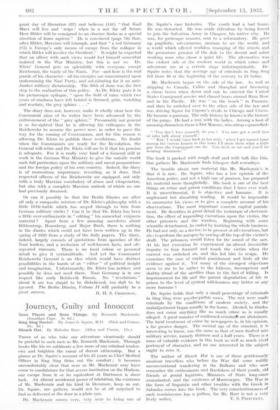Journeys, Guilty and Innocent
Been Places and Seen Things. By Kenneth Mackenzie. (Jonathan Cape. 7s. 6d.) Slouch Hat. By Malcolm Burr. (Allen and Unwin. 15s.) Trion; of us who take our adventure vicariously should be grateful to such men as Mr. Kenneth Mackenzie. Through books like his we sublimate a few more of our criminal tenden- cies and brighten the ennui of decent citizenship. But a glance at Dr. Squire's account of his 25 years as Chief Medical Officer in Sing Sing thins out the comfort ; it becomes uncomfortably clear that near as Mr. Mackenzie may have come to candidature for that severe institution on the Hudson,
our escape from it or its equivalent at Dartmoor is sheer luck. An almost accidental power of inhibition, the existence of Mr. Mackenzie and his kind in. literature, keep us out. Dr. Squire, one gathers, would not be at all surprised to find us delivered at the door in a plain van.
Mr. Mackenzie comes very, very near to being one of Dr. Squire's case histories. The youth had a bad home. He was thwarted. He was made ridiculous by being forced to join the Salvation Army in Glasgow, his native city. He was, for grotesque reasons, sent to a reformatory. He grew up pugilistic, adventurous, anxious to see the world, and a world which offered workless tramping of the streets and the premature pension of the dole to the decent and sober working man who chose a quiet life. The alternative was the violent side of the modern world in which crime and
adventure are at a certain stage indistinguishable. Dr. Squire notes that the average age of criminals in Sing Sing fell from 40 at the beginning of the century to 23 today.
Mr. Mackenzie began on the side of the law. As well as shipping to Canada, Callao and Shanghai and becoming a circus boxer when down and out, he entered the • United States Coastguard service and chased boats around Rum Row and in the Pacific. He was " on the beach " in Panama.
and then he switched over to the other side of the law and was driving liquor for Capone's rivals in Chicago and Cicero.
He became a gunman. The only history he knows is the history of the gangs. He had a way with the ladies. Among a host of amusing characters there is Dot Munroe, who always quarrelled: " You don't love yourself. do you ? You sure got a swell line of sales talk about yourself.' " ' Kid,' I would come back at her with, when I get turned loose among the canvas kissers in this town I'll show them what a little guy from the Coastguard can do. You stick to me and you'll be wearing diamonds.' " The book is packed with rough stuff and with talk like this. One gathers Mr. Mackenzie finds Glasgow dull nowadays.
The trouble about raw material like Mr. Mackenzie's is that it is raw. Dr. Squire, who has a low opinion of the
American police, and not a high one of gunmen, has prepared his material snore thoughtfully. His book is one of the best,
things on crime and prison conditions that I have ever read. It is unsentimental, it is objective and humane. It is unpleasant but absorbing' reading. It would be impossible to summarise his views or to give a complete account of his observations. The most important concern capital punish- ment. He describes in gieat detail the technique of eleetrocu- tion, the effect of impending executions upon the victim, the other prisoners and the warders. Beginning with some ' scientific detachment, he ended by loathing the whole business. He had not only, as a doctor, to be present at all executions, but ' also to perform the autopsy by sawing off the top of the victim's skull. The prisoners would listen for the sound of the saw.
At his last execution lie experienced an almost irresistible impulse to lean forward and touch the victim whea the current was switched on, and this led him to resign. He examines the ease of capital punishment' and finds all the evidence against it. Yet many of the strongest objections seem to me to be rather to the' hideous, incompetent and shabby ritual of the sacrifice than to the fact of killing. Is imprisonment for life and •the patent degradation of life in ' prison to the leVel of cynical will-lessness any better or any more humane ?
Dr. Squire holds that only a small percentage of criminals in Sing Sing were psycho-pathic. cases. The rest were made criminals by the conditions of modern society, and the maladjustment began usually in the home. Alcohol, he thinks, does not cause anything like as much crime as is usually alleged. A great number of confirmed criminag are abstainers. The lurid treatment of crime by newspapers is, in his opinion, a far greater danger, The mental age of the criminal, it is interesting to know, was the same as that of men drafted into military service, namely thirteen and a half years. There is a mass of valuable evidence in this book as well as much vivid portrayal of character, and no one interested in the subject ought to miss it.
The author of Slouch Hat is one of those gentlemanly amateur travellers who before the War did some mildly unconventional. wandering in the Balkans and ,who now . remember the enthusiasms and Baedekers of their youth, old
friends at genial legations, Ministers of State long-since assassinated, and the existence of Montenegro. The War in the form of linguistic and other troubles with the Greek in Salonika comes into the book. The very conscientiousness of ,such reminiscence has a pathos, for Mr. Burr is not a very






































 Previous page
Previous page